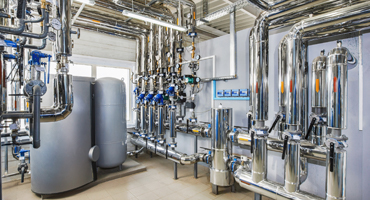Boost Your Business's Heating Potential!
Reliable, efficient, and tailored for commercial needs. Experience the transformative effects of our specialised power flushing techniques.
Accredited by
Empowering Your Commercial Operations with Power Flushing
Every business has a heating system that keeps the place warm. But sometimes, stuff builds up inside and makes it not work as well. That's where power flushing comes in! It's like giving your heating system a good clean so it can work better.
We help businesses clean out their heating systems. This means your heating can work like new again, save you money on bills, and avoid breakdowns. Think of it like a deep clean for the important parts that keep your place warm!

Complex powerflushing made simple
Optimise your commercial heating systems with Power Flush UK. Our solutions enhance efficiency and extend lifespan, all while you stay in control. With competitive pricing and industry-leading guarantees, we're the top choice for commercial heating maintenance in the UK.
How Your Business Benefits from Power Flushing
Save Money
When your heating system works better, it uses less energy. This means lower bills for your business.
Make It Last Longer
Cleaning out your heating system means it can last longer without breaking down. You won't need to replace parts or the whole system as soon.
Stay Safe
A clean system is a safe system. Less chance of things going wrong or having any accidents.
Happy Work Environment
Warm and cozy places make everyone happier. When the heating is good, everyone can work better and feel more comfortable.
Signs Your Commercial System Needs a Power Flush
Testimonials
Frequently asked questions
Power flushing is purely and simply a way of removing the rust that slowly builds up in your heating system and boiler over time. Water, chemicals, power flush equipment and an experienced plumber are used to remove the rust and sludge from your central heating. The flow of the machine is reversed from time to time using special three-way valves attached to the flushing pump. This is an extra step to help clean the pipes and radiators to remove cold spots.
Yes, we provide a full guarantee. At the end of each job we will post a certificate to you that guarantees your power flush.
No. A power flush can be undertaken by an experienced and knowledgeable engineer as we do not touch the gas supply or exhaust vent system.
If you have seen someone else’s system power flushed, you will know what an amazing amount of rust and radiator sludge can come out in all shapes and sizes. But, contrary to popular belief the vast majority of the sludge that you see does not come from your boiler. Most non-condensing boilers (those installed before 2006) have cast-iron heat exchangers, and they, by and large, do not rust. The vast majority of rust and/or sludge in your heating comes from the radiators themselves, as they are made from mild steel.
Water is made of hydrogen and oxygen (one part H and two parts O = H2O). Oxygen is highly reactive and is always looking for somewhere to latch on to instead of the Hydrogen molecule. So, any time it comes across a piece of iron that is ‘bare’, i.e. unprotected, it is going to latch on to that and makes rust (most often Fe2O3). And that’s where rust comes from. Power flushing radiators will remove that.
Once you have had a specialist do the work for you, the best way of protecting your system is to have the heating system regularly topped upped with corrosion inhibitor. These stop the rust from forming by adding a protective molecule to any exposed bare iron. That molecule (most often a form of another metal called molybdenum) parks in the place that the oxygen molecule would want to be. And the result is no rust. The only caveat to this is if your heating system has a design flaw in it and is pulling in fresh water all the time.
Yes, there are other ways of cleaning your central heating system, but they are nowhere near as effective as using the right machine when it is used by a competent and experienced heating engineer. You can add any chemical cleaner in to the system, leave for up to four weeks (Warning: careful here if you have micro-bore pipework) and then open up the system drain-cocks and let the water run out.
When you do that, the only force moving the water out of the system is gravity, and that will not pick up any larger bits of rust. Those will be left in nooks and crannies.
Yes, a power flush can fix cold radiators. Particularly if they are cold at the bottom. Sludge collects in an arc in the bottom of radiators, so if your radiator is cold in the middle or at the bottom it can be a sign that sludge is building up. Other places that sludge commonly builds up are in the airing cupboard and at the manifolds in microbore systems.
The short answer is “Yes, it can”, but with a great deal of care. 10mm microbore systems need to be approached in a very different way to standard sized pipework. 8mm microbore systems need a lot of careful thought before flushing out. Microbore pipework was first commonly introduced in the 1970s in an attempt to reduce the amount of copper needed to install a heating system.

